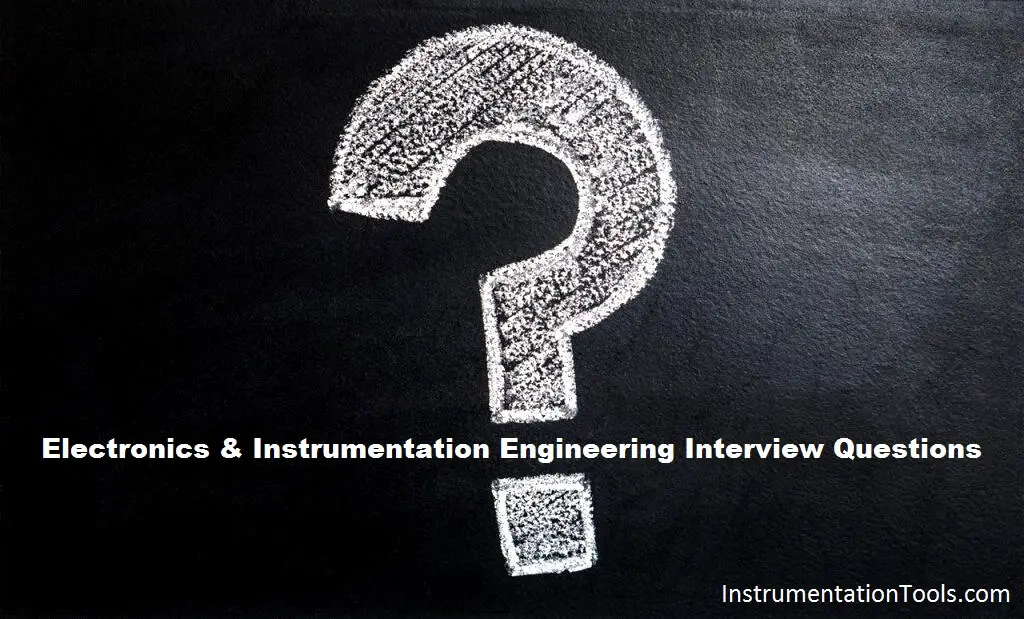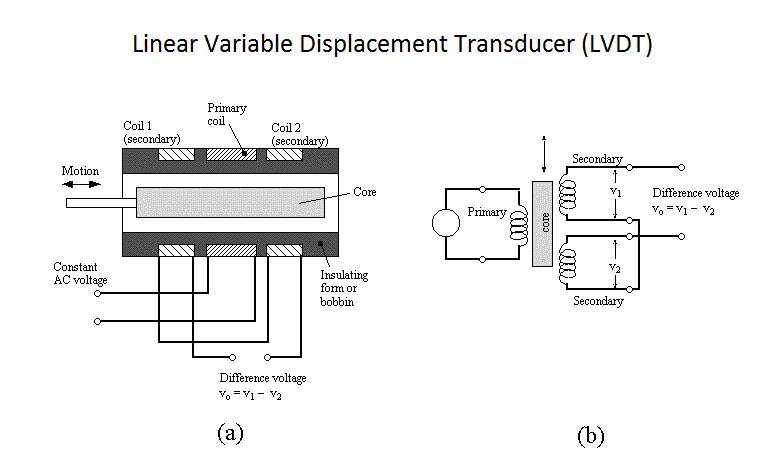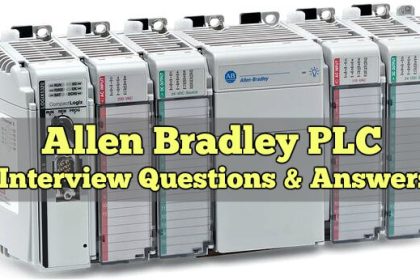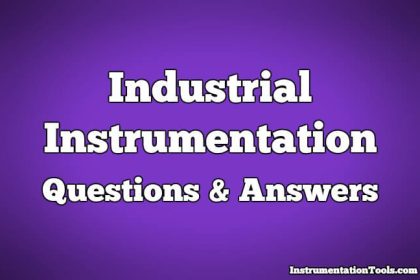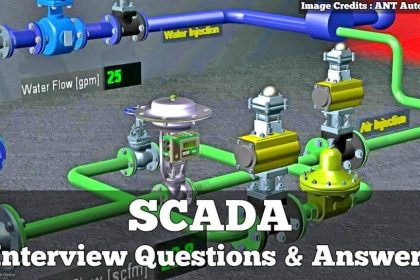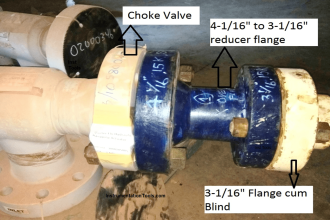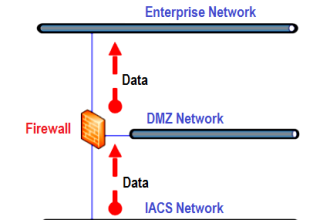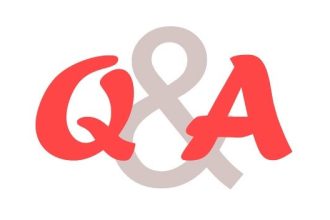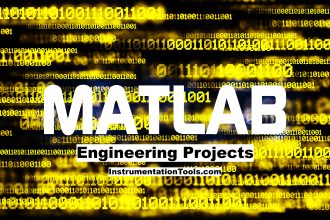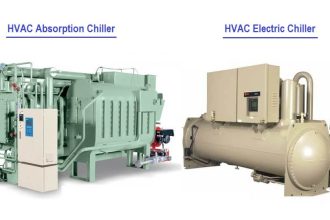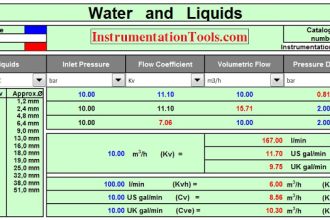Read the complete list of Electronics & Instrumentation Engineering Interview Questions and Answers For Freshers to attend the interview.
Electronics & Instrumentation Questions
Square Root Calculation For DP Flow Transmitter?
So, the way you would go about doing square root extraction is by using an analog multipler.
An analog multiplier has three inputs Vx, Vy & Vz.
The output is given by Vo = (Vx*Vy)/Vz;
If we set Vy = 1V and Vo = Vz through a feedback loop, we get Vo.^2 = Vx => Vo = sqrt(Vx).
What Is The Meaning Of Wet Leg & Where Is It Used?
A process used to determine the differential pressure present within a liquid-filled space.
The formula for determining the differential pressure within a wet leg design is: d/p = h (SG)
Where: d/p = differential pressure, h = height of liquid present, and SG = specific gravity
When the process vapors condense at normal ambient temperatures or are corrosive, this reference leg can be filled to form a wet leg. If the process condensate is corrosive, unstable, or undesirable to use to fill the wet leg, this reference leg can be filled with an inert liquid.
What Are The Key Components Of Control Loop?
A closed control loop in a very basic manner consists of sensor, transmitter, controller,signal converters and final control elements.
Actually in a practical loop there will be many other instruments apart from this to support the working of above mentioned instruments.
Explain Working Principle of LVDT ?
When an AC excitation signal is applied to the Primary Coil (P), voltages are induced in the two Secondary Coils (S).
The MAGNETIC CORE inside the COIL WINDING ASSEMBLY provides the magnetic flux path linking the Primary and secondary Coils.Since the two voltages are of opposite polarity, the Secondary Coils are connected series opposing in the center, or Null Position. The output voltages are equal and opposite in polarity and, therefore, the output voltage is zero. The Null Position of an LVDT is extremely stable and repeatable.
When the MAGNETIC CORE is displaced from the Null Position, an electromagnetic imbalance occurs. This imbalance generates a differential AC output voltage across the Secondary Coils which is linearly proportional to the direction and magnitude of the displacement.
As shown in the figure, when the MAGNETIC CORE is moved from the Null Position, the induced voltage in the Secondary Coil, toward which the Core is moved, increases while the induced voltage in the opposite Secondary Coil decreases.
LVDTs possess the inherent ruggedness and durability of a transformer and truly provide infinite resolution in all types of environments. As a result of the superior reliability and accuracy of LVDTs, they are the ideal choice for linear motion control.
What Is Difference Between Differential Pressure & Delta Pressure?
Differancial pressure means difference between high pressure & low pressure.
delta pressure means it is the pressure drop. or difference between high pressure and low pressure.
How To Trim The Pressure Transmitter?
- Ensure that you have the necessary document on your hand such as PTW.
- Connect a HART Communicator, then close the Tx isolation valve and open the VENT isolation to atmosphere.
- Apply LRV and check w/ HART Comm, if the LRV is out, perform TRIM function using HART 375/475.
Explain Types Of Valves?
various types of valves are used in industrial process controls.
Various types of valves are ball valve,gate valve,globe valve,needle valve,mixing valve,diverting valve,butterfly valve etc.
Why Use mmwc Unit?
milli meter water column used to measure pressure
What Is Difference Between PLC And CNC ?
CNC (Computer Numerical Control) is a particular application usually to control a multi axis machine tool such as a milling machine or a lathe but also could be a tube bending machine punch press or similar.
The CNC controller is usually a purpose built controller using a micro computer but could be a general purpose computer or a PLC. The forerunner was NC (Numerical Control) before computers were readily available, it used solid state logic and relays, timers etc to provide the application.
A PLC (Programmable Logic Controller) is a general purpose logic controller specifically designed to allow the user to create their own application. They select appropriate I/O (Inputs Outputs) and perhaps function modules for purposes such as communications and multi axis servo control and program the PLC to perform the required functions.
If We Have 450 Mm Height Boiler Drum Level ,so What Is Span & Zero Value For A Dpt Transmitter?
zero will be -400mm and span will be LRV will be -400mm and URV will be 0 mm.
How To Use Level Transmitter In Closed Tank Application?
In closed systems, the transmitter location is restricted by the maximum allowable distance above the lower tap. In pressurized systems, this is the same as the 1 atmosphere equivalent seen previously.
In sub-atmospheric systems (vacuum systems), the transmitter should be mounted at or below the lower tap. This ensures the transmitter always sees a positive pressure on both the measurement and the reference sides.
In two seal systems, the distance between the taps becomes the reference offset from zero. The calculations are the same regardless of where the transmitter is mounted.
What Is Coriolis Principle For Mass Flowmeter?
This meter uses the Coriolis effect to measure the amount of mass moving through the element. The substance to be measured runs through a U-shaped tube that is caused to vibrate in a perpendicular direction to the flow.
Fluid forces running through the tube interact with the vibration, causing it to twist. The greater the angle of the twist, the greater the flow.
What Are The Automatic Controller Modes?
Following are the mode of control. Ratio Control, PID Control, PI Control, ON/OFF Control, Cascade Control,Override Control, Feedback Control, Feed Froward Control.
These control are can be set in to MAN and AUTO Mode, If this in MANUAL the mode of control is disabled, If this is in AUTO the mode of control is enable.
What Is Cryogenic?
Cryogenic means to work in lower temperature range (-50 and below than that).
What Happen If I Install My Pressure Transmitter Below The Elevation Of Pipe In Natural Gas Service?
Pressure will be added up a bit more, see its detail:
Suppose,you want to install a pressure transmitter 10 meter below of pipe line.
Density of methane (Example) 0.656 kg/m3 at 25C.
your pressure transmitter will show (10 x 1000 x0.656 = 6560 mm) 6569 mm of water pressure more.
Suppose gas pressure is 20 Kg/cm2, then due to this elevation, transmitter will show 20.66Kg/cm2
Why Are Using 4ma To 20ma For Signal Transfer. Why Not 0 To 20ma?
Because we cannot detect open loop if 0-20 is used.
How Does A Signal Differ From A Wave?
Signal means information. Wave is something that carries the information from source to destination.
What Is The Difference Between Masking And Non-masking?
In 8085 processor TRAP is a non maskable interrupt.Whereas RST 7.5,6.5,5.5, intr are maskable interrupts.
Maskable means this interrupts can be left without considering during the execution of the program.
Non maskable depicts that it has to be taken into account during the execution of the program
Tell Me Why Gold Is Added To The P-n Junction?
To reduce the recombination time.
Explain What Is The Main Difference Between 8085 And 8086 Processors?
The 8085 is a 8bit processor & the 8086 is a 16bit processor. In 8085 we can’t do Multiplication or division by using single instruction but in 8086 we can do that. So that we may know that the 8086 is the superior version of 8085.
What Is The Difference Between Latch And Flip Flop?
flip flop is edge triggered,where as latch is level triggered.gate is used as control signal in latch.In FF clock is used as control input.
What Is CMOS Transistor?
Complementary metal–oxide–semiconductor (CMOS), is a major class of integrated circuits. CMOS technology is used in chips such as microprocessors, microcontrollers, static RAM, and other digital logic circuits. CMOS technology is also used for a wide variety of analog circuits such as image sensors, data converters, and highly integrated transceivers for many types of communication.
CMOS is also sometimes explained as complementary-symmetry metal–oxide–semiconductor. The words “complementary-symmetry” refer to the fact that the typical digital design style with CMOS uses complementary and symmetrical pairs of p-type and n-type MOSFETs for logic functions.
Two important characteristics of CMOS devices are high noise immunity and low static power supply drain. Significant power is only drawn when its transistors are switching between on and off states; consequently, CMOS devices do not produce as much heat as other forms of logic such as TTL (transistor-transistor logic). CMOS also allows a high density of logic functions on a chip.
The triple compound “metal–oxide–semiconductor” is a reference to the nature of the physical structure of early (and interestingly now, the very latest) field-effect transistors, having a metal gate electrode placed on top of an oxide insulator, which in turn is on top of a semiconductor material.
Instead of metal, current gate electrodes (including those up to the 65 nanometer technology node) are almost always made from a different material, polysilicon, but the terms MOS and CMOS nevertheless continue to be used for the modern descendants of the original process. (See also MOSFET.) Metal gates have made a comeback with the advent of high-k dielectric materials in the CMOS transistor as announced by IBM and Intel for the 45 nanometer node and beyond.
Explain What Are The Main Advantages Of Synchronous Circuit?
Synchronous circuits have common clock and operate utilizing the same. Whereas asynchronous circuits have different clock frequencies and operate without mutual co-ordination.
What Is A Bcd? What Are Its Advantages And Disadvantages? Why Is An Excess-3 Code Is Called An Unweighted Code?
BCD means Binary coded decimal, its advantage is it can represent decimal numbers in the form of binary value says (0000-0 to 1001-9).
Binary codes are divided into weighted binary code and non weighted binary code,Excess 3 code is an example of non weighted codes since the position of each bits in excess 3 code does not have weights says like ones, tens, hundred in decimal and 2^0,2^1,2^2, in binary.
Tell Me Why BJT Is Called Current Control Device?
Because the input current of the transistor controls the output current, for example in CE configuration base current Ib controls the output current Ic.
What Is The Difference Between Emulator And Simulator?
simulator is just software which act like a hardware.inside that u can see all the electronics component ,u can connect them in different manner and can simulate o/p as well as normal hardware do.emulator is actual hardware before performing test on real kit we can test on emulator which is exact copy of real kit on which we r willing to work.
Explain What Is The Purpose Of The Package Around A Microprocessor Silicon Die?
Packages provide protection to the silicon die from the elements like radiation temperature moisture etc.It is also required to form the body of the device which will eventually help in interfacing it to a system.
What Is The Meaning Of Tristate Signal In Electronics?
In Digital two states known as ‘0’ & ‘1’. Apart from these two we have another state that known as “Tristate”.
i.e. In digital ‘0’ for 0V to max of 0.4 to 0.8 V. ‘1’ is taken account if it is minimum of sum 2.4V to max 5.0V. In between these 0.8V to 2.4V is known as “Tristate”.
Explain Why The Input Impedance Of Op-amp Is So High?
In OPAMP, we have 4 stages, 1st stage, i.e the input stage is a dual i/p balanced o/p opamp whose i/p resistance is v high. and if we use FET in case of BJT for 1st stage diffamp, then i/p resistance will be v high in M ohms.
Explain What Does CE Mean..u Will See It On Almost Every Chip(ic)?
The CE mark is a mandatory European marking for certain product groups to indicate conformity with the essential health and safety requirements set out in European Directives. The letters ‘CE’ are an abbreviation of Conformité Européenne,French for European conformity.
The CE mark must be affixed to a product if it falls under the scope of the approx. 20 so called ‘New Approach’ Directives. Without the CE marking, and thus without complying with the provisions of the Directives, the product may not be placed in the market or put into service in the fifteen member states of the European Union and Norway, Iceland and Liechtenstein.
However, if the product meets the provisions of the applicable European Directives, and the CE mark is affixed to a product, these countries may not prohibit, restrict or impede the placing in the market or putting into service of the product.
